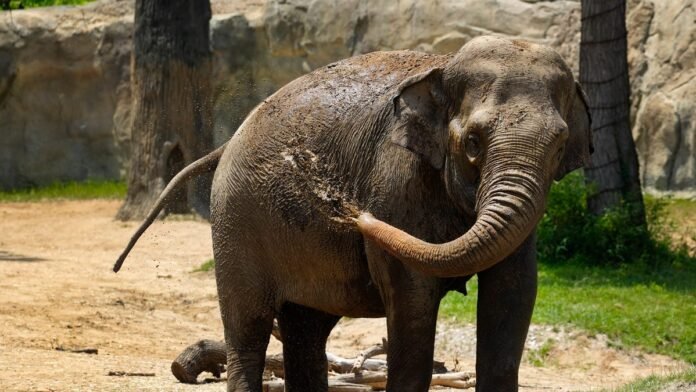Elephants stay cool in the heat at Cincinnati Zoo
Asian elephants enjoy the pool at the five-acre Harry and Linda Fath Elephant Trek at the Cincinnati Zoo & Botanical Garden.
Two young elephants at the Cincinnati Zoo & Botanical Garden, Sanjay and Kabir, have overcome a deadly virus thanks to a new vaccine introduced to zoos nationwide last year.
Sanjay and Kabir are testing negative for the deadly Elephant Endotheliotropic Herpesvirus (EEHV) after receiving a first-of-its-kind mRNA vaccine, the Cincinnati Zoo shared in a press release.
With a mortality rate of 60-80%, the virus is the leading cause of death for juvenile Asian elephants in North America and Europe. It has claimed hundreds of lives among elephants in human care and wild free roaming elephants in range countries, the zoo stated.
The Cincinnati elephants’ recovery marks the first case in the country in which elephants vaccinated against EEHV became infected with the virus then later test negative, zoo communications director Michelle Curley told The Enquirer.
The mRNA vaccine is the result of a more than 15-year partnership between the Houston Zoo and the Baylor College of Medicine’s Department of Virology and Microbiology in the study of EEHV.
“This vaccine … is a tremendous source of hope for the future of Asian elephants, both in zoos and in the wild,” Dr. Mike Wenninger, director of animal health at the Cincinnati Zoo, said. “We are incredibly grateful for this collaboration and that it helped save Sanjay and Kabir’s lives.”
The vaccine, which works to create antibodies against the virus in the animal’s bloodstream, was announced and successfully administered for the first time in June 2024 to Tess, a 40-year-old Asian elephant at Houston Zoo.
Sanjay and Kabir received the vaccine in fall 2024, with early results indicating both elephants developed strong antibody responses against the virus. In February of this year, low levels of the virus were detected in Sanjay’s blood, indicating the elephant was in the early stage of infection.
Soon after, Kabir also showed signs of a mild EEHV infection, but both elephants recovered without needing treatment. In each animal, viral levels remained low and cleared while antibody levels continued to rise, indicating the EEHV vaccine did its job and helped their immune systems control the virus.
Sanjay and Kabir’s vaccination made the Cincinnati Zoo the third zoo to vaccinate elephants against EEHV, following the Houston Zoo and the Rosamond Gifford Zoo in Syracuse, New York.






